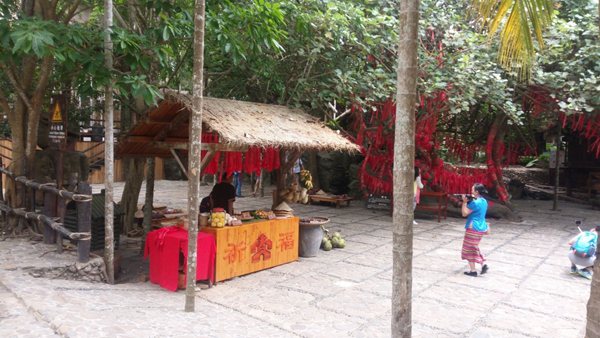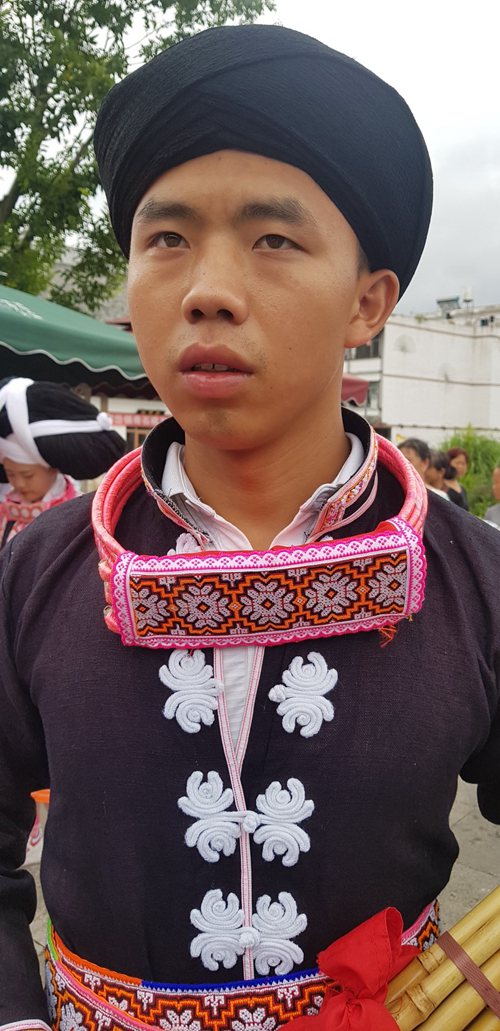


Yang San Mei displaying the special traditional necklace
There are a variety of differences in terms of traditional wedding culture between three ethnic groups, the Yi and Li minorities in China and the Fula minority in Sierra Leone.
Both the Yi minority in Langdai town, Guizhou Province and the Li ethnic minorities in GanZa village, Hainan Province have differences in the way they carry out traditional wedding ceremonies. The same applies to the Fula ethnic group in Sierra Leone.
The Yi ethnic minority, also known as Nuosuo, who mainly occupy rural areas of Sichuan, Yunnan, Guizhou and Guangxi provinces, are the seventh largest of the 56 ethnic groups officially recognized in the People’s Republic of China. The ethnic group has a population of approximately eight million people.
On the other hand, the Li ethnic minority, who occupy the southern coast of Hainan Island, has a population of only 1.3 million people.
In Sierra Leone, the Fula ethnic minority is the third largest, constituting 10 percent of the country’s population, mainly occupying the northern districts of Koinadugu and Falaba. This ethnic group also has a rich marriage culture.
In the Yi ethnic minority, if a woman loves a man, she will present a special kind of traditional necklace. Similarly, if the man is interested in the woman, he will first accept and later return the necklace to her.
However, if he doesn’t return the traditional necklace, it means he doesn’t return her love and that will be the end of the story.
Yang San Mei, a young woman from the Yi ethnic minority in Langdai town, Guizhou Province, explained that in most cases, the men do not refuse such advances, adding that there are some instances where the men can refuse, for example if the ladies are not beautiful or do not know how to prepare food, sing or dance very well in public during their traditional festival.
“These are some of the qualities that a man looks for if a woman approaches him with a traditional necklace. In any traditional festival, when all the men and women gather together, men are always observant of the way the women sing and dance. Men are enticed by the manner in which the women dance,” Yang continued.
She noted that the bride price in her ethnic group is chicken and wine and these items are considered more valuable than money.

Some of the shortest betel nut trees at the National Li and Miao Ethnic Minority Cultural Park in Hainan Province
“A man has to present 12 chickens and 36 liters of wine to the parents of the bride in order to marry her,” she revealed.
In many countries and cultures, after marriage, a new bride will immediately be taken to the husband’s house or in some cases she will spend one or two days with her parents before leaving for her husband’s home.
However, the Yi ethnic minority in China has opposing ideas about the number of days a woman should spend with her parents after marriage.
Yang disclosed that after marriage, a bride will spend three years with her parents before she leaves for her husband’s house. In explanation, she said it was their tradition.
There is also a vast difference between the way Yi and Li ethnic minorities carry out their wedding ceremonies.
In the Li ethnic minority, a man has to climb 49 slim, tall and branchless betel nut trees in order to marry a woman.
Can anyone do this for love? I wonder how many men in the modern day big cities of China would climb 49 slim, tall and branchless trees just to marry a woman.
A tour guide in GanZa village, at the National Li and Miao Ethnic Minority Cultural Park, pointed at one of the betel nut trees and explained that a man has to climb 49 of them to marry his bride.
The park, which has been dubbed the “mysterious village hidden in the rainforest”, has been ranked among the top ten filming locations in China.
According to the tour guide, in their tradition, girls have to leave their family home at the age of 16 to live alone in thatched huts close to their parents.

Yang San Mei illustrates how young women in the village put on a special necklace to attract young men
In the Yi ethnic minority, the young woman offers a traditional necklace to the young man to propose her love for him, but in the Li ethnic minority, a young man has the freedom to enter the thatched hut to get to know the girl.
“The young woman will in turn ask her suitor to stay the night if she loves him but if she does not, the gentleman will be asked leave,” the tour guide explains.
Afterwards, if the girl and her husband-to-be want to live with each other and start a family, the groom’s parents will take some clothes and betel nuts to the bride’s parents.
The bride’s parents have the right to express their dissatisfaction if the betel nuts presented to them are too few or too small. On the wedding day, they will sing, dance and feast on port and mutton.
However, they will not prepare white chicken as part of their celebration meal, as it is believed that the couple will quarrel frequently after marriage if this dish is served. Hence, black chicken is served instead.
In the Fula ethnic group, daughters remain with their mothers until they marry. They are normally approached by men.
However, as soon as a son reaches puberty, he leaves the family compound and lives alone nearby, usually taking over a part of his father’s trade. This new compound will be the home of the son and his future wife.
In Fula culture, for a man to marry, he must first of all be a Muslim and someone that can offer his five daily prayers as the Islamic doctrine dictates.
Secondly, the person must be a Fula and he must be able to speak the Fula language fluently. This is important because when the couple start to have children, they will pass on their cultural values to them, and it’s important that they don’t lose their culture and tradition.

A young man puts on the special necklace to show if he accepts a lady’s approaches
Thirdly, the young man must own an enterprise in the village or a herd of cattle. Most Fulas are cattle rearers while the women trade and sell the milk.
On the day of the wedding, the parents of the husband will present cattle that are at least five years old, 24 kola nuts and white chicken to the bride’s parents.
The food also usually includes lots of beef and chicken as an indication of the husband’s wealth.
The bride is usually dressed in a white traditional dress and sits on a praying mat which is placed on the floor, with her face covered by a veil.
The relatives of the bride will sing and dance while enjoying the feast. Singers are known as “yelibas”, which means literally to cause a huge crowd to throw money at them thanks to their sweet and melodious voices. Many Fulas in rural Sierra Leone refer to modern day journalists as “yelibas” because of their advocacy skills in order to influence decisions of policymakers.
After marriage, the bride will be escorted by her relatives to her husband’s house whilst singing and dancing to celebrate the joyous occasion.
 Fire brigade in Shanghai holds group wedding
Fire brigade in Shanghai holds group wedding Tourists enjoy ice sculptures in Datan Town, north China
Tourists enjoy ice sculptures in Datan Town, north China Sunset scenery of Dayan Pagoda in Xi'an
Sunset scenery of Dayan Pagoda in Xi'an Tourists have fun at scenic spot in Nanlong Town, NW China
Tourists have fun at scenic spot in Nanlong Town, NW China Harbin attracts tourists by making best use of ice in winter
Harbin attracts tourists by making best use of ice in winter In pics: FIS Alpine Ski Women's World Cup Slalom
In pics: FIS Alpine Ski Women's World Cup Slalom Black-necked cranes rest at reservoir in Lhunzhub County, Lhasa
Black-necked cranes rest at reservoir in Lhunzhub County, Lhasa China's FAST telescope will be available to foreign scientists in April
China's FAST telescope will be available to foreign scientists in April "She power" plays indispensable role in poverty alleviation
"She power" plays indispensable role in poverty alleviation Top 10 world news events of People's Daily in 2020
Top 10 world news events of People's Daily in 2020 Top 10 China news events of People's Daily in 2020
Top 10 China news events of People's Daily in 2020 Top 10 media buzzwords of 2020
Top 10 media buzzwords of 2020 Year-ender:10 major tourism stories of 2020
Year-ender:10 major tourism stories of 2020 No interference in Venezuelan issues
No interference in Venezuelan issues
 Biz prepares for trade spat
Biz prepares for trade spat
 Broadcasting Continent
Broadcasting Continent Australia wins Chinese CEOs as US loses
Australia wins Chinese CEOs as US loses